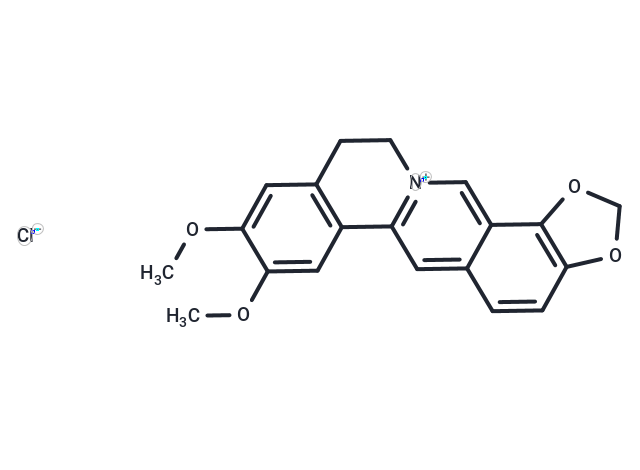Shopping Cart
- Remove All
 Your shopping cart is currently empty
Your shopping cart is currently empty

Epiberberine chloride, a natural pro-berberine from Coptis chinensis Franch. is an AChE, BChE, and BACE1 inhibitor with IC50 values of 1.07, 6.03, and 8.55 μM, respectively.Epiberberine chloride has antioxidant effects and inhibits the effects of Ca9-22 and Fa2R. Epiberberine chloride has antioxidant effects, inhibits the motility of Ca9-22 and FaDu cell lines, and can be used to study hyperlipidemia, Alzheimer's disease and diabetes.

| Pack Size | Price | Availability | Quantity |
|---|---|---|---|
| 1 mg | $32 | In Stock | |
| 5 mg | $73 | In Stock | |
| 10 mg | $98 | In Stock | |
| 25 mg | $198 | In Stock | |
| 50 mg | $298 | In Stock | |
| 100 mg | $443 | In Stock | |
| 1 mL x 10 mM (in DMSO) | $80 | In Stock |
| Description | Epiberberine chloride, a natural pro-berberine from Coptis chinensis Franch. is an AChE, BChE, and BACE1 inhibitor with IC50 values of 1.07, 6.03, and 8.55 μM, respectively.Epiberberine chloride has antioxidant effects and inhibits the effects of Ca9-22 and Fa2R. Epiberberine chloride has antioxidant effects, inhibits the motility of Ca9-22 and FaDu cell lines, and can be used to study hyperlipidemia, Alzheimer's disease and diabetes. |
| Targets&IC50 | BACE1:8.55 μM, AChE:1.07 µM, BChE:6.03 µM |
| In vitro | Epiberberine chloride has antioxidant activity, with peroxynitrite ONOO- scavenging effect (IC50, 16.83 μM), and may protect against Alzheimer disease[1]. Epiberberine (0, 12.5, 25, or 50 μM) dose-dependently inhibits cellular triglyceride accumulation in 3T3-L1 adipocytes (IC50: 52.8 μM). Epiberberine (12.5-50 μM) suppresses the Raf/MEK1/ERK1/2 and AMPKα/Akt pathways in the early stage of 3T3-L1 adipocyte differentiation [2]. Epiberberine (0.2, 1, 5 μg/mL) inhibits glucose uptake in HepG2 cells in a concentration-dependent manner [3]. |
| In vivo | Body weight, food consumption, water intake, and urinary output of KK-Ay mice were reduced after being treated with Epiberberine (225 mg/kg, p.o. daily for 40 days). |
| Molecular Weight | 371.81 |
| Formula | C20H18ClNO4 |
| Cas No. | 889665-86-5 |
| Smiles | [Cl-].COc1cc2CC[n+]3cc4c5OCOc5ccc4cc3-c2cc1OC |
| Relative Density. | 1.31g/cm3 |
| Storage | keep away from moisture | Powder: -20°C for 3 years | In solvent: -80°C for 1 year | Shipping with blue ice. | ||||||||||||||||||||||||||||||
| Solubility Information | DMSO: 20 mg/mL (53.80 mM), Sonication is recommended. | ||||||||||||||||||||||||||||||
Solution Preparation Table | |||||||||||||||||||||||||||||||
DMSO
| |||||||||||||||||||||||||||||||

Copyright © 2015-2025 TargetMol Chemicals Inc. All Rights Reserved.